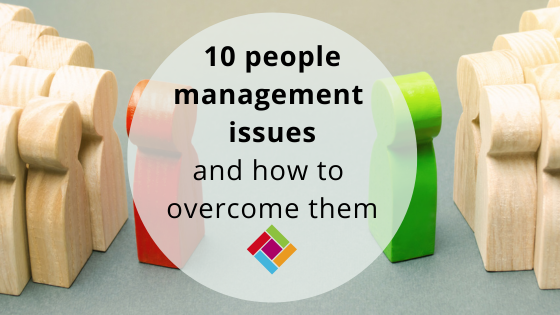
Effective people management is crucial for the success of any organisation. So often we see managers unable or unwilling to deal with performance and people management issues. It can be easy to ignore the issue, in the hope that they will go away, but realistically this only pushes the issue further down the line. We delve into some of the most common people management issues and how to overcome them with practical solutions to create a positive work environment.
Breakdowns in communication
A lack of, or ineffective, communication, can often lead to misunderstanding. This then translates into low morale and a lack of cohesion among team members. It’s therefore essential to prioritise transparent and open communication channels with staff. Use communication tools such as Microsoft Teams or Slack. Host regular team meetings, or schedule one to one check-ins with employees. This can help nip any potential issues early on and before they develop into a bigger issue.
Lack of employee engagement
Employees who are not engaged can damage productivity and have an impact on the morale of those around them. Creating a positive company culture will help employees to feel valued, and that their contributions are important. Read our guide to creating a company culture. All of this can be achieved through mechanisms like employee reward and recognition programmes, professional development opportunities and offering regular feedback.
Being unclear on performance expectations
If your employee doesn’t understand what’s expected of them, then understandably it leads to frustration and a decline in performance. All employees should have clear performance expectations, accompanied by measurable goals – backed up by regular feedback.
Lack of training and development
Employees all need ongoing training and development to stay up to date and flourish. Employers should be looking at ways in which they can upskill the workforce as a major retention tool. Read our guide to setting up a training scheme.
Workplace conflict
In all workplaces, some conflicts will inevitably arise. How they are managed however can have a significant impact on the workplace environment. It’s essential to establish a resolution process that promotes open communication and provides mediation as and when is necessary. Conflicts can be avoided in workplaces that value diverse perspectives.
Lack of work-life balance/ wellbeing initiatives
This is a growing area of concern for employees, and wellbeing should be at the forefront of all employers’ priorities. Employees can be supported through flexible work initiatives, hybrid / remote working options and moving away from the culture of working overtime.
A high employee turnover
Not only is this costly and disruptive to the business, but it’s bad for morale. Conducting regular staff surveys to monitor employee satisfaction can help to identify potential issues and address the causes. Read our guide to conducting staff surveys. Other factors should be considered, including offering competitive salaries, training opportunities and clear pathways for career advancement can all help to retain top talent.
A lack of diversity and inclusion
Employers who fail to create a diverse and inclusive workplace can stunt growth, and damage their company culture. This can be addressed through inclusive hiring practices, supporting employees with their needs and providing appropriate training. Read how our client Platypus has created a diverse workplace through its inclusive hiring practices.
Resistance to change
It can be easy for staff to be reluctant to embrace change, particularly if they don’t understand the reasoning behind it. Any change needs to be clearly communicated, involving employees in the decision-making process and supported throughout.
Lack of reward and recognition
Those employees who feel their efforts go unnoticed will inevitably become disengaged and demotivated. Regularly acknowledging and rewarding achievements, large or small, goes a long way in boosting morale. This in turn helps to create a positive workplace culture and encourages staff to perform at their best.
Navigating the intricacies of people management is a continuous process that requires dedication and adaptability. By addressing these common issues, employers can create a workplace where employees feel valued, engaged, and motivated to contribute to the organisation’s success.